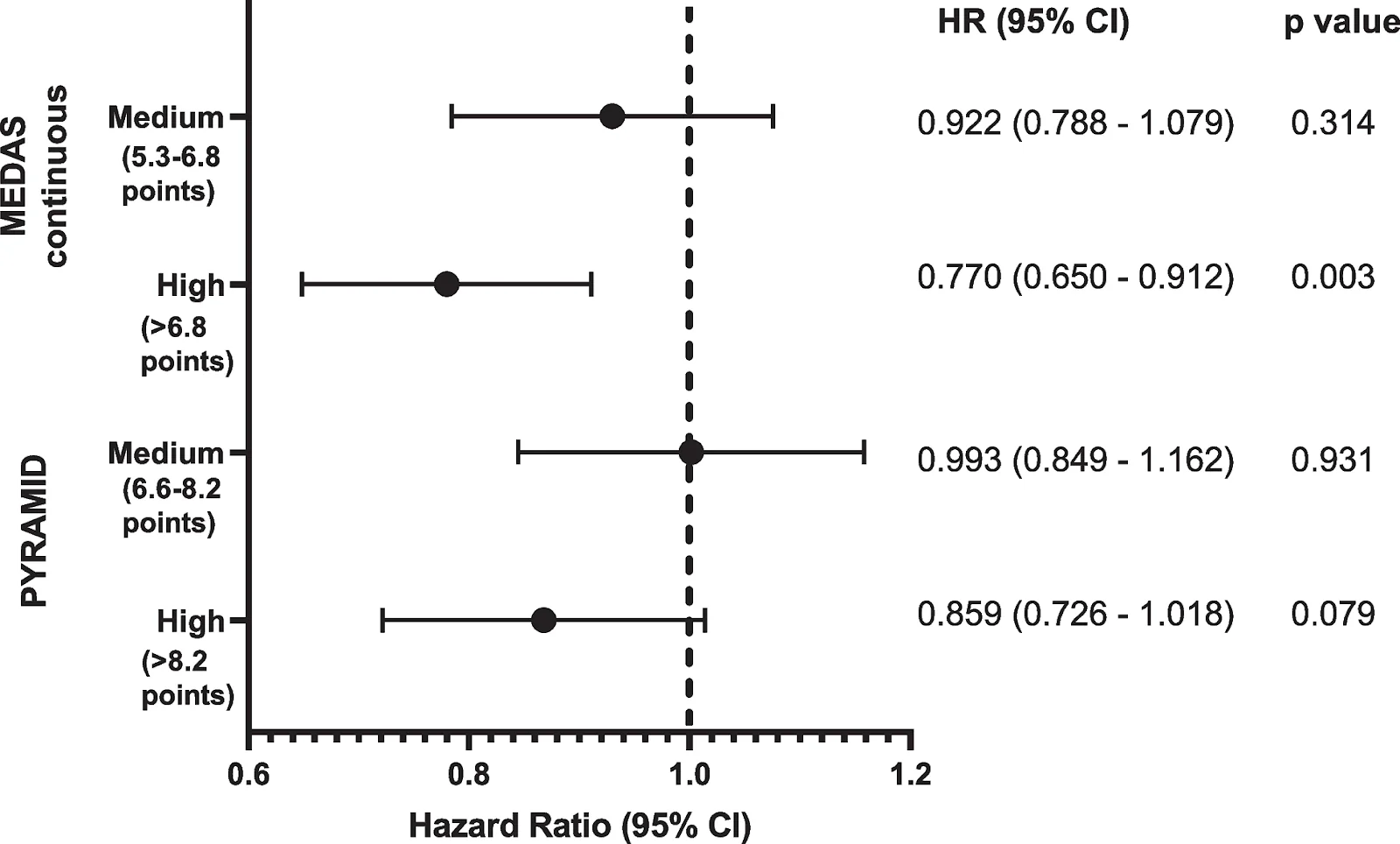In a large-scale observational study, British scientists have shown that high levels of adherence to the Mediterranean diet might substantially lower the risk of dementia [1].
A healthy diet
The Mediterranean diet, which is based on ingredients such as olive oil, vegetables, legumes, fish, and whole grains, is considered one of the healthiest in the world. While most of the evidence comes from observational studies that have well-known limitations, there is also a handful of randomized clinical trials [2]. The Mediterranean diet has been linked to decreased risk of cardiovascular and all-cause mortality [3], improved cognitive function [4], and other health benefits, but data on its effect on dementia has been sparce and inconclusive.
Power of the study
This study, like many other recent studies, was based on data from UK Biobank, a huge repository of health information on some half a million of British citizen. Compared to previous studies, it had several strengths, including its size. The researchers assembled a cohort of about 60 thousand older adults with 882 cases of dementia recorded during a 9-year average follow-up period, which allowed for considerable statistical power.
A known problem with such studies is that they often make do with a single questionnaire to ascertain dietary patterns. In this cohort, however, participants not only filed in a detailed 24-hour assessment of their diets online, but most did this more than once, which allowed the researchers to gauge adherence.
The researchers employed two similar scores widely used to measure adherence to the Mediterranean diet: MEDAS and PYRAMID. Moreover, they improved the existing MEDAS scoring system that awards a binary score for 14 food types (you either meet the requirement or not) by making it continuous. The authors also adjusted for numerous potential confounding variables, including age, socioeconomic status, educational attainment, BMI, physical activity, smoking, and even sleep duration, and conducted several sensitivity analyses.
More adherence is associated with more benefits
In the fully adjusted model, high adherence to the Mediterranean diet according to the continuous MEDAS score was associated with a 23% decrease in the risk of all-cause dementia. This result was highly statistically significant. High adherence according to the PYRAMID score was associated with a smaller 14% risk decrease and nearly reached the significance threshold. Medium adherence did not seem to provide a lot of protection. A sensitivity analysis showed the negative correlation between Mediterranean diet and fatal cases of dementia to be the strongest.

Few other studies have considered the relationship between diet and genetic risk for dementia. Those that did mostly limited it to the APOE genotype, which is known to be strongly correlated with Alzheimer’s risk. In this study, the researchers developed a polygenic score that combined information from multiple weighted risk alleles.
Importantly, no significant interaction between adherence to the Mediterranean diet and a polygenic risk for dementia was detected. In other words, the Mediterranean diet seemed to help lower the risk of dementia even in people who were genetically predisposed to it. However, this association did not hold in some scenarios, which is why the authors of the study call for more research.
Limited demographic scope
The researchers also note an important limitation inherent to UK Biobank: it mostly contains data on people who self-reported their ethnic backgrounds as British, Irish, or otherwise European, which may limit the applicability of the results to other populations. The scientists were also unable to reliably ascertain consumption of one of the most important components of the Mediterranean diet, olive oil, as the questionnaire only asked participants whether they used olive oil for cooking. It is possible that with this data available, the correlation between the Mediterranean diet and risk of dementia would have been even more robust.
Dr Oliver Shannon of Newcastle University, one of the study’s lead authors, notes in a blog post that currently, our options for treating dementia are very limited, which makes prevention especially important. “Much more research is needed to identify the best diet that people could follow to try and reduce their risk of dementia”, Shannon admits. “However, the findings from our study contribute towards a growing body of evidence to suggest that following a more Mediterranean-like diet could be an effective way to help ‘oil your cogs’ and reduce your risk of developing dementia”.
Conclusion
This study, while observational and hence insufficient to establish causation, provides further evidence of the Mediterranean diet’s connection to lifespan and healthspan.
Literature
[1] Shannon, O. M., Ranson, J. M., Gregory, S., Macpherson, H., Milte, C., Lentjes, M., … & Stevenson, E. (2023). Mediterranean diet adherence is associated with lower dementia risk, independent of genetic predisposition: findings from the UK Biobank prospective cohort study. BMC medicine, 21(1), 1-13.
[2] Valls-Pedret, C., Sala-Vila, A., Serra-Mir, M., Corella, D., De la Torre, R., Martínez-González, M. Á., … & Ros, E. (2015). Mediterranean diet and age-related cognitive decline: a randomized clinical trial. JAMA internal medicine, 175(7), 1094-1103.
[3] Hidalgo-Liberona, N., Meroño, T., Zamora-Ros, R., Rabassa, M., Semba, R., Tanaka, T., … & Cherubini, A. (2021). Adherence to the Mediterranean diet assessed by a novel dietary biomarker score and mortality in older adults: the InCHIANTI cohort study. BMC medicine, 19(1), 1-13.
[4] Tsivgoulis, G., Judd, S., Letter, A. J., Alexandrov, A. V., Howard, G., Nahab, F., … & Wadley, V. G. (2013). Adherence to a Mediterranean diet and risk of incident cognitive impairment. Neurology, 80(18), 1684-1692.




